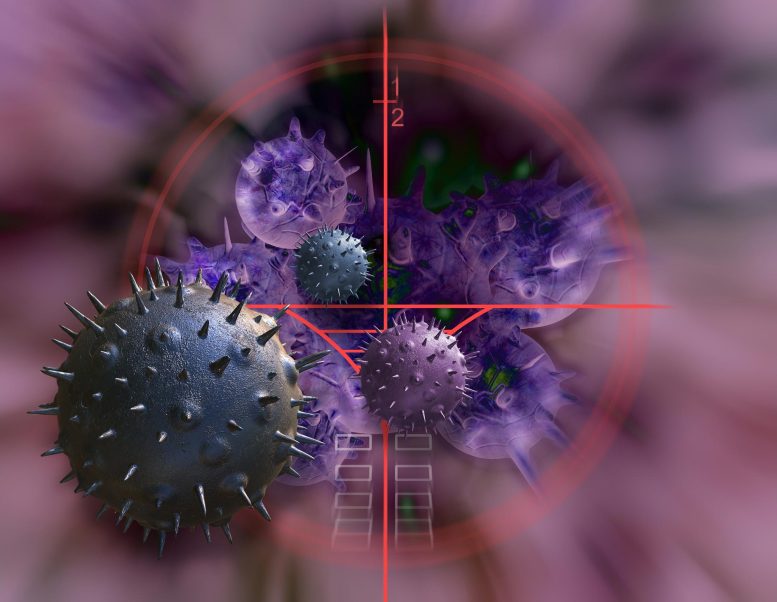
Researchers report successful results from a cost-effective experimental cancer-detection system that uses cell-free DNA in blood samples.
Research led by UCLA’s Jonsson Comprehensive Cancer Center tests a cost-effective approach to early-cancer detection from cell-free DNA in blood samples.
Early detection remains paramount to successfully treating many cancers. A growing research focal point is early detection via cell-free DNA (cfDNA) circulating in the bloodstream – the so-called “liquid biopsy.” However, using this method to detect cancer at its early stages has been challenging due to the genetic diversity of cancer and low tumor concentrations in DNA blood fragments.
Now, researchers report successful results from an experimental cancer-detection system that appears to have overcome these challenges in a novel, cost-effective way. The study, by researchers at the Jonsson Comprehensive Cancer Center at the University of California, Los Angeles (UCLA) and collaborating organizations, will be published today (September 29) in the journal Nature Communications.
Their work highlights an approach that offers more than 12-fold cost-savings over conventional methods to sequence cfDNA methylome, along with a computational model to extract information from this DNA sequencing to aid early detection and diagnosis.
Cell-free DNA methylation has been demonstrated to be one of the most promising biomarkers for early cancer detection. However, the signatures of cfDNA aberrations from diverse cancer types, subtypes, stages, and etiologies are heterogeneous. This leads to substantial challenges in identifying methylation markers suitable for early detection. This is especially of concern because the currently available sample sizes are small compared to the diversity of diseases and the patient population (age, gender, ethnicity, and comorbidity).
Profiling cfDNA methylome can address this challenge because it retains the genome-wide epigenetic profiles of cancer abnormalities. Therefore, it permits the classification models to learn and exploit newly significant features as training cohorts grow, as well as expand their scope to more cancer types. However, the traditional way of profiling the cell-free DNA methylome (whole-genome bisulfite sequencing) is cost-prohibitive for clinical use.
“Our method, cfMethyl-seq, makes cfDNA methylome sequencing a viable option for clinical use”, says Xianghong “Jasmine” Zhou. She is a corresponding author for the study and a professor of pathology and laboratory medicine at UCLA. “Despite the inherent challenges, our study shows tremendous potential for accurate early diagnosis of certain cancers from a single blood test.”
Zhou and colleagues in her UCLA lab focus on precision medicine. This includes the use of patients’ genomic information to develop more personalized, targeted treatments, as well as big biodata analysis to integrate complex data from various platforms and modalities into practical methods that can be used in clinical settings.
For this study, Zhou and collaborators put their novel approach to the test to see if it could accurately detect four commonly diagnosed cancers – colon, liver, lung, and stomach cancer – and do so at early stages.
The scientists collected blood samples from 408 study participants and applied their methylome-based blood test, which can identify a broad range of markers for different cancer types and possible causes. Of those, 217 were cancer patients and 191 were cancer-free control subjects. Samples were collected at UCLA’s hospitals or purchased from commercial laboratories to achieve cross-source validation. Researchers also performed cross-batch validations, age-matched validations, and independent validations to prevent bias in the study.
Following collection and validation measures, researchers entered the data into their sophisticated computer model to measure its accuracy not only at detecting cancer, but also the tumor’s specific location, referred to as “tissue of origin.”
Their model was 80.7% accurate in detecting cancers across all stages and about 74.5% accurate in detecting early-stage cancers – those at stages I or II – with just under 98% specificity. There was only one incorrectly classified normal sample (false positive).
For tissue-of-origin accuracy, the model correctly identified tumor location with an average accuracy of 89.1% percent for all cancer stages and about 85% percent in early-stage patients.
“The key to early cancer detection is to identify the true cancer biomarkers, which requires a large cohort of training samples to cover the heterogeneity of cancer and population, especially for pan-cancer detection. Our cfDNA methylome approach allows the inclusion of new markers and the better weighting of existing markers as training cohorts grow. Indeed, our data show that as training sample sizes increase, the detection power of our method continues to increase,” said Zhou, who is a member of the UCLA Jonsson Comprehensive Cancer Center’s Gene Regulation Program. “With its cost-effective methylome sequencing, cfMethyl-seq can truly facilitate a big data approach for cancer detection.”
The team is currently pursuing funding for large clinical trials to validate the technology in hopes of bringing it to use to benefit patients.
Reference: “Cost-effective Methylome Sequencing of Cell-free DNA for Accurately Detecting and Locating Cancer” 29 September 2022, Nature Communications.
DOI: 10.1038/s41467-022-32995-6
Co-first authors are Mary L. Stackpole, Weihua Zeng, and Shuo Li, all of the Department of Pathology and Laboratory Medicine, David Geffen School of Medicine, the University of California at Los Angeles.
This work was supported by the National Cancer Institute (grant no. U01CA230705 to Xianghong Jasmine Zhou, Samuel French, and Steven-Huy Han., grant no. R01CA246329 to Xianghong Jasmine Zhou, Wenyuan Li, and Steven Dubinett, grant no. U01CA237711 to Wenyuan Li, grant no. R43CA246941 to Xiaohui Ni, grant nos. R01CA210360 and U01CA214182 to Denise Aberle, and grant nos. R01CA253651 and R01CA246304 to Vatche Agopian), the National Science Foundation Graduate Research Fellowship (grant no. DGE-1418060 to Mary Stackpole), and the National Institute of Health (grant no. UM1HG011593 to Frank Alber and grant no. R01CA255727 to Yazhen Zhu) This work was supported by a Stand Up To Cancer-LUNGevity-American Lung Association Lung Cancer Interception Dream Team Translational Cancer Research Grant (grant number: SU2C-AACR-DT23-17 to Steve Dubinett). Research funding from the Department of Veteran Affairs.
Xianghong Jasmine Zhou, Wenyuan Li, and Wing Hung Wong are co-founders of EarlyDiagnostics, Inc., Mary L. Stackpole, Xiaohui Ni, and Chun-Chi Liu are employees of EarlyDiagnostics, Inc, Shuo Li, Weihua Zeng and Yonggang Zhou are consultants to EarlyDiagnostics, Inc, and Steven M. Dubinett was a scientific advisor to EarlyDiagnostics Inc. The authors have filed a patent application for the methods described in this manuscript. The other authors have no competing interests to declare.

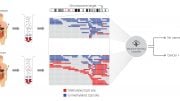
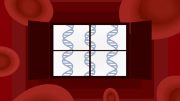
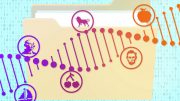
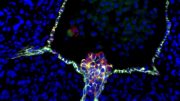
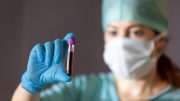
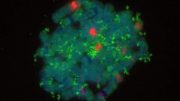
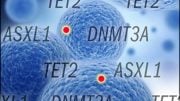
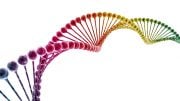
Be the first to comment on "“Liquid Biopsy” – Cost-Effective Early-Cancer Detection From Cell-Free DNA in Blood Samples"